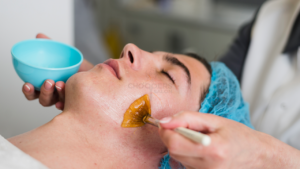Winter often brings with it the discomfort of dry skin, a condition that many people struggle to manage effectively. When cold air, low humidity, and indoor heating combine, they strip moisture from the skin, leaving it feeling tight, flaky, and sensitive. In this guide, we’ll explore natural remedies for dry skin in winter, providing simple, accessible ways to maintain soft, healthy skin through the colder months.
Understanding Why Skin Gets Dry in Winter
The cold winter season creates an environment where moisture is quickly lost from the skin, mainly due to:
- Cold air: Reduces skin hydration.
- Indoor heating: Causes air to become even drier.
- Hot showers: Strips natural oils from the skin.
With a few adjustments and natural ingredients, it’s possible to counteract these effects and keep your skin soft and healthy.
Top Natural Remedies for Winter Dryness
1. Moisturize with Natural Oils
Natural oils are highly effective at keeping skin hydrated and soft. Some of the best oils for dry skin include:
- Olive oil: High in antioxidants and vitamins, it nourishes and locks in moisture.
- Coconut oil: Contains fatty acids that protect the skin barrier and provide long-lasting hydration.
- Almond oil: Gentle and suitable for sensitive skin, this oil provides deep hydration.
Apply these oils directly to damp skin after showering for maximum effect.
2. Oatmeal Bath Soaks
Oatmeal is a soothing and moisturizing remedy that works wonders for irritated, dry skin. To make an oatmeal bath soak:
- Grind one cup of oatmeal into a fine powder.
- Add it to a warm bath and soak for 15–20 minutes.
- Pat the skin dry afterward to retain the soothing effect.
Oatmeal baths are especially helpful for reducing itchiness and flakiness.
3. Honey and Aloe Vera as Natural Moisturizers
Honey and Aloe Vera are both natural humectants, meaning they draw moisture to the skin. To use them:
- Honey: Apply a thin layer to your skin, let it sit for 10–15 minutes, then rinse with lukewarm water.
- Aloe Vera: Apply pure aloe vera gel to the skin; it absorbs quickly and provides a layer of hydration without feeling greasy.
These natural ingredients are excellent for soothing irritation and locking in moisture.
4. Stay Hydrated Internally
Hydration isn’t only about what you apply to your skin—it’s also about what you consume. Drink plenty of water and consider adding hydrating foods to your diet.
- Cucumbers, oranges, and melons: Naturally high in water content and beneficial nutrients.
- Healthy fats: Avocados, nuts, and seeds support skin health from within.
5. Use a Humidifier at Home
Indoor heating can make indoor air extremely dry, which impacts your skin’s moisture levels. A humidifier in your home:
- Adds moisture back into the air.
- Helps maintain skin hydration, especially overnight.
Running a humidifier at night can be especially effective in preventing dry skin during the winter months.
6. Avoid Hot Showers and Harsh Soaps
While a hot shower might feel great on a cold day, it can strip your skin of essential oils. Instead:
- Use lukewarm water when bathing or washing your face.
- Switch to a gentle, fragrance-free cleanser that won’t irritate or dry out your skin.
Tips for Consistent Winter Skincare Routine
To maximize the benefits of natural remedies, consider these additional tips for your winter skincare:
- Apply moisturizers to damp skin to trap moisture.
- Use a thicker moisturizer at night to keep skin hydrated while you sleep.
- Exfoliate gently once a week to remove dead skin cells, allowing your moisturizer to penetrate more effectively.
Conclusion:
Dry skin in winter doesn’t have to be a constant struggle. By using natural oils, soothing bath soaks, and following a few hydration tips, you can maintain soft, comfortable skin throughout the season. Small adjustments in your daily routine, like switching to a gentle cleanser and using a humidifier, can make a big difference. Embrace these natural remedies to keep your skin glowing and healthy, no matter how low the temperature drops.
FAQs (frequently-asked questions)
Generally, oils like olive, coconut, and almond oil are safe for most skin types. However, if you have sensitive or acne-prone skin, consider testing a small area first.
Oatmeal baths can be used up to twice a week, especially if your skin feels itchy or inflamed.
Yes, honey is suitable for most skin types and has antimicrobial properties, making it gentle enough for sensitive skin.
Yes, a humidifier can significantly reduce the drying effects of indoor heating, helping to maintain skin hydration throughout winter.
Try to limit sugary and highly processed foods, as they can exacerbate skin dryness and inflammation.




